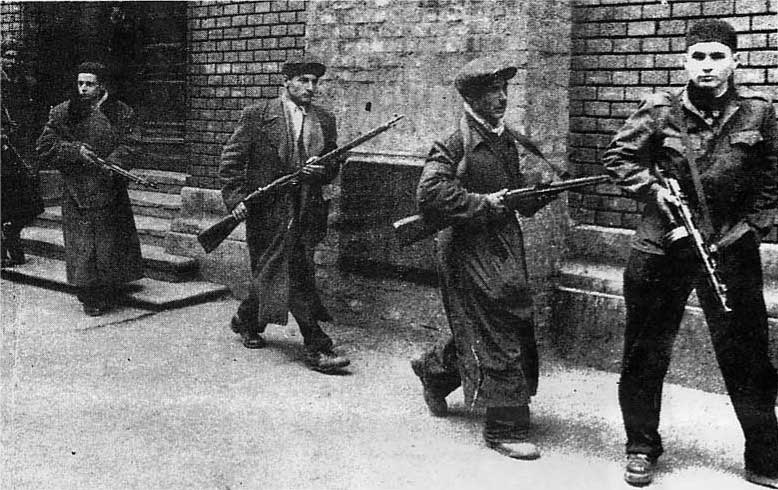As the brutal heat wave continued on throughout the country, on June 28 1936 the leader of the Anarcho-Syndicalist movement in America died. Alexander Berkman, a would-be assassin and writer passed away after losing his battle with his prostate condition. His body was taken back to his homeland of Lithuania for his funeral. This death of a prominent leader was a blow to the CSA, and the movement suffered a severe set-back with this event. It was decided a few days later, by a congress of prominent members of the CSA during an emergency conference held in Chicago that the anarcho-syndicalist torch would be passed on to John “Jack” Reed. John Reed accepted, claiming that he’d do his best to serve syndicalist interests across America, and raise awareness of the workers plight.
 Alexander Berkman, former leader of the syndicalist movement in America.
Alexander Berkman, former leader of the syndicalist movement in America.The next month of July saw the U.S. getting a break from the stress of political conflict and the heat wave. Americans came together all across the country and set aside their differences to celebrate the birth of their country on the 4th of July. Ten days later on July 14th, American hockey fans rejoiced as the Detroit Red Wings swept the Toronto Maple Leaves in the ’36 Stanley Cup, winning 4-2 and returning the cup back to hockey-town where it belongs. For an entire day people weren’t rioting over political differences, they were
rioting over the championship.
 The 1936 Detroit Red Wings.
The 1936 Detroit Red Wings.Nearing the end of the month, on July 22nd a private letter was sent to the man behind the strongest political environment in the United States, the army. General Mac Arthur received a letter from Edward the VIII stating that he personally wanted political stability for America. He also stated in the letter that a putsch to save America as something that Canada would ultimately not support. This letter served to state the relationship between the United States and Canada at the time, but also showed to Mac Arthur that the Canadians would be unwilling to help America in the event of a civil war.

Douglas MacArthur, General of the United States army.
August was a rather uneventful month, with dissent being surprisingly low leading up to election month as each presidential candidate gears up for the election. The temperature slowly lowers over time, with things getting more and more bearable every day. By the start of September, it seemed that the Great Heat Wave of 1936 was finally over. The estimated death toll was around 5,000 during the deadliest natural disaster to hit America came to an end. Although with the American populace relieved by the end of the heat wave, a new chapter of American history is about to begin.
September 2, 1936. The social system of the U.S. breaks down, and the presidential election is like none ever seen before in American history. In the south and Midwest, the America First Union organizes and trains various right-wing militias and the syndicalists in the Great Lakes region practically control the streets of Detroit and Chicago. General Mac Arthur along with a few other senior generals confront President Hoover, convinced that they must cancel the election and suspend the constitution to avoid the collapse of the nation. President Hoover, an unpopular and disliked president is tasked with making one of the most difficult decisions in the history of America. A few hours after the generals confront him, President Hoover decides that the elections would go ahead as planned despite the political conflict. General Mac Arthur leaves the white house in anger, convinced that the very fabric of the United States will tear at the seams.
.jpg?404=a404&maxwidth=314&watermark)
President Herbert Hoover, a week before his decisions.
Two months later, after a frantic and unstable election day with some cities having militia from the respective sides denying people to vote for opposing candidates, the results of the 1936 Presidential Election were in. Votes were counted multiple times, to ensure the utmost accuracy. The four major candidates, John Nance Gardner (Democrat), Charles Curtis (Republican), Huey Long (America First Union), and John “Jack” Reed (Combined Syndicates of America) waited in a mix of anxiety and anticipation for the results of the election.
 Members of a Syndicalist Militia patrol the streets of Chicago.
Members of a Syndicalist Militia patrol the streets of Chicago.
 Poll
Poll
 Author
Topic: The Disunited States of America (Darkest Hour: Kaiserreich) (Read 40943 times)
Author
Topic: The Disunited States of America (Darkest Hour: Kaiserreich) (Read 40943 times)


